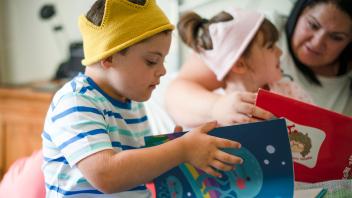Recently I got into a discussion with a group of site coordinators who work for Everybody Wins , a program that brings adults into schools on a weekly basis to read aloud with students. The program encourages its volunteer reading mentors and students to keep track of what they read together. In the past, the program has recognized students with certificates and/or books or other trinkets for reaching certain reading goals.
The coordinators all believe that reading is its own reward, but also realize that having reading incentives can help catch and focus kids’ attention. Knowing their students’ interests and tastes, they all had different ways of recognizing their readers’ accomplishments, such as letting students post a book review on the bulletin board, having them choose a new book to keep, or letting them pick something from the treasure chest.
Whether it’s a good idea to keep track of what’s read and how to celebrate reaching certain milestones is to wonder what messages those practices send to children about reading for pleasure. So, I asked myself: Do I keep track of what I’ve read, and do I enjoy rewards for reading?
I don’t typically make a list and write down every book I read. I have — and it is fun to look back at a year’s worth of reading — but I don’t really like trying to remember to write something down, mark it on Goodreads, or generally have to keep track of one more thing.
I do reward myself for reading. I talk to people about what I’ve read. I recommend books to students, teachers, and parents and am always excited to share. I also reward myself by finding ways to connect with the authors of books I enjoyed — from following them on social media to attending author events at bookstores and conferences.
But how did I get to that point? How did I become a self-motivated reader?
I still remember with great pride getting my photo in the local paper for winning a medal in the library’s summer reading Olympics, and I still have the end-of-the-school-year certificates that showed how many books I’d read in 3rd, 4th and 5th grades. I do think that being recognized for being a reader — just like my peers were recognized for Little League or the science fair — made an impression.
As did having caring adults in my life who cheered me on as a reader. My local librarian, my principal, and my teachers talked to me about books and cared about what I was reading. My parents cheered me on too — but knowing that reading was something I could do with or without my parents gave me freedom to grow as a reader and the opportunity to bring something of my own to conversations, be it questions or ideas about interracial families (Black Is Brown Is Tan ), cerebral palsy (With Love from Karen ), or Jewish holidays (All-of-a-Kind Family ).
I think that what Linda Gambrell and Barbara Marinak share in Simple Practices to Nurture the Motivation to Read makes for good practice. And I also agree with much of what Jen Robinson had to say recently about Rekindling Intrinsic Motivation After Extrinsic Rewards Damage It .
But ultimately, for me and for the Everybody Wins participants, I think what might be best is to continue to focus on and nurture the relationships that readers build with each other through books and the excitement of sharing the joys of reading. As Gambrell and Marinak note, reading passions should be made public. And if making those passions public puts a certificate in your hand or your photo in the paper, that might not hurt either.

About the Author
Join children’s literacy consultant Rachael Walker and many of the authors, parents, and educators she’s met and worked with to talk about how books have changed their lives, how to bring books to life for young readers, and how to enrich kids’ lives with good books.

